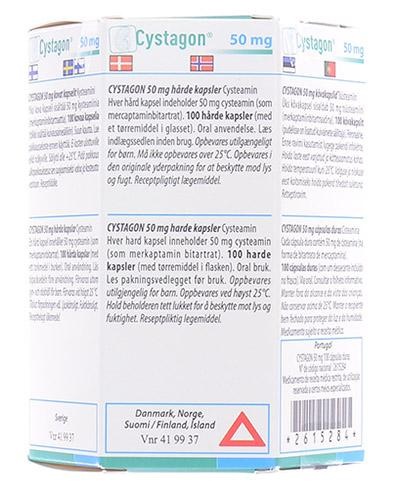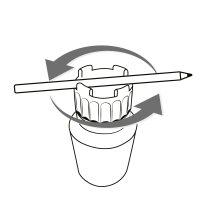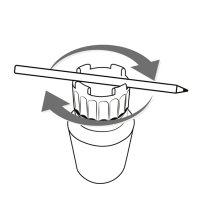
CYSTAGON 50 mg CAPSULAS DURAS


Cómo usar CYSTAGON 50 mg CAPSULAS DURAS
Traducción generada por IA
Este contenido ha sido traducido automáticamente y se ofrece solo con fines informativos. No sustituye la consulta con un profesional sanitario.
Ver originalContenido del prospecto
Introducción
Prospecto: Información para el usuario
CYSTAGON 50 mg Cápsulas Duras
CYSTAGON 150 mg Cápsulas Duras
bitartrato de cisteamina (bitartrato de mercaptamina)
Lea todo el prospecto detenidamente antes de empezar a usar el medicamento, porque contiene información importante para usted.
- Conserve este prospecto, ya que puede tener que volver a leerlo.
- Si tiene alguna duda, consulte a su médico o farmacéutico.
- Este medicamento se le ha recetado solamente a usted, y no debe dárselo a otras personas aunque tengan los mismos síntomas que usted, ya que puede perjudicarles.
- Si experimenta efectos adversos, consulte a su médico o farmacéutico, incluso si se trata de efectos adversos que no aparecen en este prospecto. Ver sección 4.
Contenido del prospecto:
- Qué es CYSTAGON y para qué se utiliza
- Qué necesita saber antes de empezar a usar CYSTAGON
- Cómo usar CYSTAGON
- Posibles efectos adversos
- Conservación de CYSTAGON
- Contenido del envase e información adicional
1. Qué es Cystagon y para qué se utiliza
La cistinosis es una enfermedad metabólica llamada ‘cistinosis nefropática’ que se caracteriza por la acumulación anormal del aminoácido cistina en varios órganos del cuerpo tales como los riñones, ojos, músculos, páncreas y cerebro. La acumulación de cistina produce lesiones en el riñón y la eliminación de cantidades excesivas de azúcar (glucosa), proteínas y electrolitos. A diferentes edades puede afectarse diferentes órganos.
CYSTAGON se prescribe para tratar este trastorno hereditario raro. CYSTAGON es un medicamento que reacciona con la cistina disminuyendo sus niveles en las células.
2. Qué necesita saber antes de empezar a usar Cystagon
No tome CYSTAGON:
- si usted o su hijo son alérgicos al bitartrato de cisteamina o a la penicilamina o a cualquiera de los demás componentes de este medicamento (incluidos en la sección 6).
- si está embarazada, esto es especialmente importante durante el primer trimestre
- si está en periodo de lactancia.
Advertencias y precauciones:
- Cuando se haya confirmado su enfermedad o la de su hijo mediante mediciones de cistina leucocitarias, el tratamiento con CYSTAGON debe iniciarse lo antes posible.
- Se han comunicado algunos casos de lesiones cutáneas en forma de pequeños bultos duros fundamentalmente en los codos en niños tratados con altas dosis de diferentes preparados de cisteamina. Estas lesiones estaban asociadas con estrías en la piel y lesiones óseas, tales como fracturas y deformaciones de los huesos, y con articulaciones laxas.
Su médico podrá pedirle de forma periódica exploraciones físicas de la piel y exámenes radiográficos de los huesos para controlar los efectos del medicamento. Se recomienda la autoexploración de la piel por parte del paciente o de los padres. En caso de aparecer alguna anomalía cutánea u ósea, debe informar a su médico inmediatamente.
- Su médico podrá pedirle análisis de sangre periódicos, para poder controlar el recuento de células sanguíneas.
- CYSTAGON no previene la acumulación de cristales de cisteína en los ojos. Si se han utilizado soluciones oftálmicas de cisteamina con este objeto, debe continuar utilizándolas...
- Al contrario que la fosfocisteamina, otro principio activo similar al bitartrato de cisteamina, CYSTAGON no contiene fosfato. Puede que usted este tomando suplementos de fosfato y es posible que le modifiquen la dosis de los mismos cuando le cambien el tratamiento de CYSTAGON a fosfocisteamina.
- No se debe administrar las cápsulas a niños menores de aproximadamente 6 años para evitar el riesgo de aspiración en los pulmones.
- No ingerir el recipiente con desecante que hay en el frasco.
Otros medicamentos y CYSTAGON
Informe a su médico o farmacéutico si está utilizando, ha utilizado recientemente o pudiera tener que utilizar cualquier otro medicamento.
CYSTAGON con alimentos y bebidas:
Para los niños menores de seis años, se puede abrir la cápsula dura y esparcir su contenido en los alimentos (por ejemplo leche, patatas o alimentos con almidón como harinas), o mezclarlo con el biberón. No se debe mezclar con bebidas ácidas, como el zumo de naranja. Para obtener indicaciones completas consulte a su médico.
Embarazo
No se debe usar CYSTAGON durante el embarazo. Debe usted consultar al médico si tiene pensado quedarse embarazada.
Lactancia
CYSTAGON no debe usarse durante la lactancia.
Conducción y uso de máquinas:
CYSTAGON puede causar somnolencia. Al iniciar el tratamiento, su niño o usted deben evitar realizar actividades potencialmente peligrosas hasta que se conozcan bien los efectos del medicamento.
3. Cómo usar Cystagon
Siga exactamente las instrucciones de administración de este medicamento indicadas por su médico o el de su hijo. En caso de dudas, consulte de nuevo a su médico.
La dosis de CYSTAGON prescrita para usted o para su niño dependerá del peso y de la edad que tenga usted o su hijo.
Para niños de hasta 12 años, la dosis irá en función del tamaño corporal (área de superficie), siendo la dosis habitual 1,30 g/m2 de área de superficie corporal al día.
Para pacientes mayores de 12 años y de más de 50 kg de peso, la dosis habitual es 2 g/día.
En cualquier caso, la dosis habitual no deberá superar 1,95 g/m2/día.
CYSTAGON debe tomarse siempre por vía oral y siguiendo exactamente las indicaciones de su médico o el de su niño. Con el fin de conseguir que CYSTAGON funcione correctamente, es necesario:
- Seguir exactamente las indicaciones del médico. No se debe aumentar ni disminuir la cantidad de medicamento sin la aprobación del médico.
- No administrar las cápsulas duras a los niños menores de seis años de edad porque podrían no tragarlas y atragantarse. Para los niños menores de seis años, se puede abrir la cápsula dura y esparcir su contenido en los alimentos (por ejemplo leche, patatas o alimentos con almidón como las harinas), o mezclarlo con el biberón. No se debe mezclar con bebidas ácidas, tales como el zumo de naranja. Para obtener las recomendaciones adecuadas consulte a su médico.
- El tratamiento médico que le ha sido prescrito a usted o a su niño incluirá, además de CYSTAGON, uno o más suplementos para reponer los electrolitos importantes eliminados por los riñones. Es importante tomar o dar esos suplementos siguiendo exactamente las instrucciones que le hayan indicado. Si se le olvidan varias dosis de uno de los suplementos, o si nota debilidad o somnolencia, debe consultar a su médico inmediatamente.
- Para determinar la dosis correcta de CYSTAGON es necesario que le realicen análisis sanguíneos de forma periódica para medir la cantidad de cistina dentro de los leucocitos. Su médico o el médico de su niño determinará en qué momento debe realizarse los análisis de sangre. También es necesario realizar periódicamente análisis de sangre y de orina para medir las concentraciones de los electrolitos importantes en el organismo, para que su médico pueda ajustar las dosis de los suplementos de electrolitos que necesita.
CYSTAGON se debe tomar 4 veces al día, cada 6 horas, preferentemente con las comidas o inmediatamente después de las comidas. Es importante que respete la norma de tomar la dosis cada seis horas en la forma más estricta posible.
El tratamiento de CYSTAGON debe continuarse de forma indefinida como le indique su médico.
Para abrir y cerrar con facilidad el frasco de Cystagon, siga las instrucciones incluidas a continuación:
Instrucciones para abrir y cerrar el envase
ABRIR
| CERRAR
|
Para abrir el envase Coloque un bolígrafo o un objeto similar entre las partes elevadas de la tapa y gírelo en la dirección indicada (en sentido contrario al de las agujas del reloj) | Para cerrar el envase Coloque un bolígrafo o un objeto similar entre las partes elevadas de la tapa y gírelo en la dirección indicada (en sentido de las agujas del reloj) |
Si usa más CYSTAGON del que debiera
Si se ha ingerido mayor cantidad de medicamento de la que le han prescrito, o si se produce somnolencia debe consultar con su médico o el de su hijo inmediatamente, o acudir al servicio de urgencias de un hospital.
Si olvidó tomar CYSTAGON
Si ha olvidado tomar una dosis del medicamento, tómela tan pronto como le sea posible. Sin embargo, si ya faltan menos de 2 horas para la siguiente dosis, se debe saltar la toma olvidada y volver al esquema normal. No tome una dosis doble para compensar las dosis olvidadas.
4. Posibles efectos adversos
Al igual que todos los medicamentos, este medicamento puede producir efectos adversos, aunque no todas las personas los sufran.
CYSTAGON puede producir en algunas personas somnolencia o disminución de la capacidad de alerta con respecto a su estado normal. Asegúrese de cómo reacciona usted o su niño a este medicamento, antes de emprender cualquier actividad que pueda entrañar peligro si no se está alerta.
Se han comunicado los siguientes efectos adversos de la siguiente manera: muy frecuentes (se produce en al menos uno de cada 10 pacientes), frecuentes (se produce en al menos uno de cada 100 pacientes), poco frecuentes (se produce en al menos uno de cada 1.000 pacientes), raros (se produce en al menos uno de cada 10.000 pacientes), muy raros (se produce en al menos uno de cada 100.000 pacientes).
- Muy frecuentes: vómitos, náuseas, diarrea, pérdida de apetito, fiebre y sensación de sueño.
- Frecuentes: dolor o molestias abdominales, mal aliento y olor corporal desagradable, erupción cutánea, gastroenteritis, fatiga, dolor de cabeza, encefalopatía (trastorno cerebral) y alteración de las pruebas de función hepática.
- Poco frecuentes: estrías en la piel, lesiones cutáneas (pequeños bultos duros en los codos), articulaciones laxas, dolor de pierna, fracturas óseas, escoliosis (desviación de la columna vertebral), deformaciones y fragilidad óseas, despigmentación del cabello, reacción alérgica grave, somnolencia, convulsiones, nerviosismo, alucinaciones, disminución del número de células blancas de la sangre, úlcera gastrointestinal con hemorragia digestiva secundaria y alteraciones renales que se manifiestan con hinchazón de las extremidades y aumento de peso.
Como algunos de estos efectos adversos son graves, solicite a al médico o al pediatra que le explique los signos de alarma.
Comunicación de efectos adversos
Si experimenta cualquier tipo de efecto adverso, consulte a su médico o farmacéutico, incluso si se trata de posibles efectos adversos que no aparecen en este prospecto. También puede comunicarlos directamente a través del sistema nacional de notificación incluido en el Apéndice V. Mediante la comunicación de efectos adversos usted puede contribuir a proporcionar más información sobre la seguridad de este medicamento.
5. Conservación de Cystagon
Mantener este medicamento fuera de la vista y del alcance de los niños.
No utilice este medicamento después de la fecha de caducidad que aparece en la etiqueta después de CAD. La fecha de caducidad es el último día del mes que se indica.
No conservar a temperatura superior a 25°C.
Mantener el envase perfectamente cerrado para protegerlo de la luz y de la humedad.
Los medicamentos no se deben tirar por los desagües ni a la basura. Pregunte a su farmacéutico cómo deshacerse de los envases y de los medicamentos que ya no necesita. De esta forma, ayudará a proteger el medio ambiente.
6. Contenido del envase e información adicional
Composición de CYSTAGON
- El principio activo es bitartrato de cisteamina (bitartrato de mercaptamina). Cada cápsula dura de CYSTAGON 50 mg contiene 50 mg de cisteamina (en forma de bitartrato de mercaptamina). Cada cápsula dura de CYSTAGON 150 mg contiene 150 mg de cisteamina (en forma de bitartrato de mercaptamina).
- Los demás componentes son celulosa microcristalina, almidón pregelatinizado, estearato de magnesio/laurilsulfato sódico, dióxido de sílice coloidal, croscarmelosa sódica. Las cubiertas de las cápsulas: gelatina, dióxido de titanio, tinta negra en las cápsulas duras (E172).
Aspecto del producto y contenido del envase
Cápsulas duras
- Cystagon 50 mg: Cápsulas duras opacas blancas con las leyendas CYSTA 50 en el cuerpo y RECORDATI RARE DISEASES en la cápsula de cierre.
Frascos de 100 ó 500 cápsulas duras. Puede que solamente estén comercializados algunos tamaños de envases.
- Cystagon 150 mg: Cápsulas duras opacas blancas con las leyendas CYSTAGON 150 en el cuerpo y RECORDATI RARE DISEASES en la cápsula de cierre.
Frascos de 100 ó 500 cápsulas duras. Puede que solamente estén comercializados algunos tamaños de envases.
Titular de la autorización de comercialización
Recordati Rare Diseases
Immeuble “Le Wilson”
70, Avenue du Général de Gaulle
F-92800 Puteaux
Francia
Responsable de la fabricación
Recordati Rare Diseases
Immeuble “Le Wilson”
70, Avenue du Général de Gaulle
F-92800 Puteaux
Francia
o
Recordati Rare Diseases
Eco River Parc
30, rue des Peupliers
F-92000 Nanterre
Francia
Pueden solicitar más información respecto a este medicamento dirigiéndose al representante local del titular de la autorización de comercialización.
België/Belgique/Belgien Recordati Tél/Tel: +32 2 46101 36 | Lietuva Recordati AB. Tel: + 46 8 545 80 230 Švedija |
| Luxembourg/Luxemburg Recordati Tél/Tel: +32 2 46101 36 Belgique/Belgien |
Ceská republika Recordati Rare Diseases Tel: +33 (0)1 47 73 64 58 Francie | Magyarország Recordati Rare Diseases Tel: +33 (0)1 47 73 64 58 Franciaország |
Danmark Recordati AB. Tlf : +46 8 545 80 230 Sverige | Malta Recordati Rare Diseases Tel: +33 1 47 73 64 58 Franza |
Deutschland Recordati Rare Diseases Germany GmbH Tel: +49 731 140 554 0 | Nederland Recordati Tel: +32 2 46101 36 België |
Eesti Recordati AB. Tel: + 46 8 545 80 230 Rootsi | Norge Recordati AB. Tlf : +46 8 545 80 230 Sverige |
Ελλ?δα Recordati Rare Diseases Τηλ: +33 1 47 73 64 58 Γαλλ?α | Österreich Recordati Rare Diseases Germany GmbH Tel: +49 731 140 554 0 Deutschland |
España Recordati Rare Diseases Spain S.L.U. Tel: + 34 91 659 28 90 | Polska Recordati Rare Diseases Tel: +33 (0)1 47 73 64 58 Francja |
France Recordati Rare Diseases Tél: +33 (0)1 47 73 64 58 | Portugal Jaba Recordati S.A. Tel: +351 21 432 95 00 |
Hrvatska Recordati Rare Diseases Tél: +33 (0)1 47 73 64 58 Francuska | România Recordati Rare Diseases Tel: +33 (0)1 47 73 64 58 Franta |
Ireland Recordati Rare Diseases Tel: +33 (0)1 47 73 64 58 France | Slovenija Recordati Rare Diseases Tel: +33 (0)1 47 73 64 58 Francija |
Ísland Recordati AB. Simi:+46 8 545 80 230 Svíþjóð | Slovenská republika Recordati Rare Diseases Tel: +33 (0)1 47 73 64 58 Francúzsko |
Italia Recordati Rare Diseases Italy Srl Tel: +39 02 487 87 173 | Suomi/Finland Recordati AB. Puh/Tel : +46 8 545 80 230 Sverige |
Κ?προς Recordati Rare Diseases Τηλ : +33 1 47 73 64 58 Γαλλ?α | Sverige Recordati AB. Tel : +46 8 545 80 230 |
Latvija Recordati AB. Tel: + 46 8 545 80 230 Zviedrija | United Kingdom (Northern Ireland) Recordati Rare Diseases UK Ltd. Tel: +44 (0)1491 414333 |
Fecha de la última revisión de este prospecto:07/2024
La información detallada de este medicamento está disponible en la página web de la Agencia Europea de Medicamentos: http://www.ema.europa.eu/
- País de registro
- Principio activo
- Requiere recetaSí
- Fabricante
- Esta información es de carácter general y no sustituye la consulta con un profesional sanitario.
- Alternativas a CYSTAGON 50 mg CAPSULAS DURASForma farmacéutica: CAPSULA, 150 mgPrincipio activo: mercaptamineFabricante: Recordati Rare DiseasesRequiere recetaForma farmacéutica: CAPSULA, 25 mgPrincipio activo: mercaptamineFabricante: Chiesi Farmaceutici S.P.A.Requiere recetaForma farmacéutica: CAPSULA, 75 mgPrincipio activo: mercaptamineFabricante: Chiesi Farmaceutici S.P.A.Requiere receta
Médicos online para CYSTAGON 50 mg CAPSULAS DURAS
Comenta la dosis, los posibles efectos secundarios, interacciones, contraindicaciones o la revisión de receta de CYSTAGON 50 mg CAPSULAS DURAS, sujeto a valoración médica y a la normativa local.
Preguntas frecuentes


















